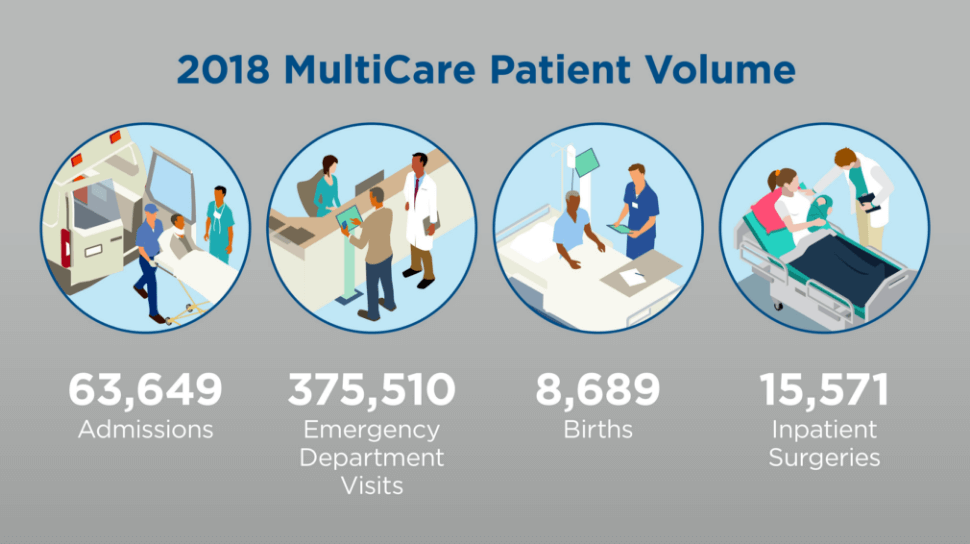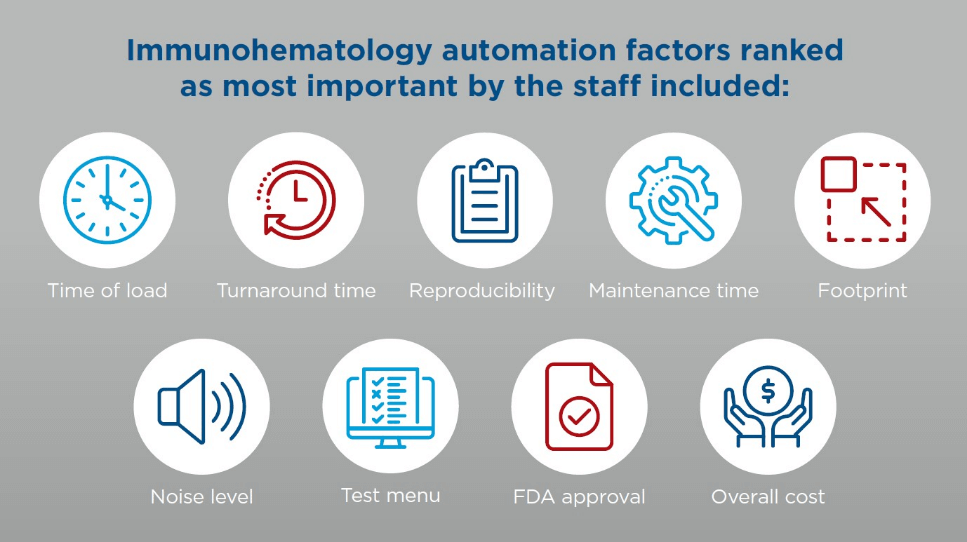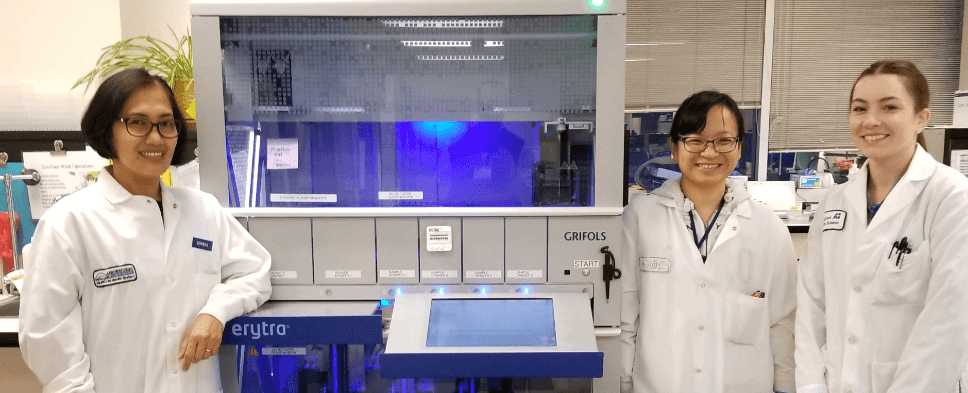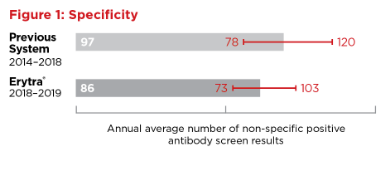Grifols Erytra: Implementation of a New Automated Blood Bank System for MultiCare Health System
MultiCare Health System, Tacoma, WA

Introduction
The MultiCare Health System has achieved considerable reduction of tech hands-on time while effectively reducing the number of false positive results. With the introduction of an Erytra to their transfusion service reference laboratory late in 2018, MultiCare was able to gain more than 1000 hours of valuable tech time that has been used to improve the quality of service offered to nurses and doctors. Considerable reduction of false positive samples, on the other hand, favorably affects patients' treatment and time spent in the hospital.
Background

Headquartered in Tacoma, Washington, the MultiCare Health System is a not-for-profit healthcare organization that includes eight hospitals across the Puget Sound and Eastern Washington regions. MultiCare Health System offers a comprehensive list of services covering primary care, urgent care, numerous specialties, as well as a Level II pediatric trauma center (Mary Bridge Children's Hospital), and a level IV neonatal intensive care unit (MultiCare Tacoma General Hospital).
MultiCare's transfusion laboratories provide full service in most of the western hospitals, with partial Type & Screen (T&S) testing at Covington as well as in the two eastern hospitals. The transfusion laboratory at MultiCare Tacoma General Hospital serves the immunohematology reference laboratory for complex cases resolution.

Challenge
Until June 2017, MultiCare was using an automated solid phase system with the contract expiring in August 2018. In June 2017, a request for information (RFI) was initiated for selection of a new automated analyzer. Tenders were received from three different manufacturers of blood bank automation with immunohematology analyzers.
Fifty-seven criteria were defined and ranked in order of importance by 70 transfusion medicine laboratory staff across the system. A decision tree based on these criteria was developed according to their importance under the coordination of Mike Charapata MBA, MT(ASCP)SBBCM, Manager, Transfusion Services at MultiCare Health System.

Solution
The results of the on-site evaluation were in favor of the Grifols Erytra based on several key factors, such as time of load, turnaround time, footprint, noise level, maintenance (hands-on and downtime during maintenance), and reproducibility of results. Subsequent to these evaluations, the Erytra and its DG Gel technology were successfully implemented across the MultiCare transfusion laboratory network and went live on October 29, 2018.

Results
After a year of routine testing on the new platform, it was time to evaluate its performance within the laboratory system as compared to historical data.
Tech Hands-on Time
Historically, it took approximately 2 minutes 10 seconds in the pre-analytical phase for samples, reagents preparation, and loading each sample on the prior system. With the Erytra, these tasks are now completed in an average of less than 30 seconds per sample. (Table 1)
Mike added, "If one adds up all time used for daily, monthly, and yearly maintenance, the Erytra requires only 5 minutes hands-on per day for maintenance. With the prior system, the hands-on time was approximately 21 minutes per day. Thus again we are saving around 15 minutes hands-on time per day for maintenance, which brings us to 90 hours saved per year. If you consider that we use the Erytra at our four main sites, we are talking about more than 360 hours of hands-on time saved for our techs. Adding on the 650 hours gained during sample preparation and loading steps, we are at over 1,000 hours saved!"
The time gained per tech is used for improving customer service for doctors and nurses, as well as general problem solving. In addition, MultiCare's staff can spend more time on other activities in the lab such as blood inventory management, ultimately resulting in increased productivity.

The increased specificity of the Erytra compared to the previous system translated into 1-3 fewer reflex antibody identifications per month for non-specific positive antibody screen results. "Although this may not sound like it has a significant effect, for these 1-3 patient(s), the impact is considerable, resulting in faster blood supply and contributing towards a shorter length of hospital stay," noted Mike. Similarly, the much stronger Anti-D reactions obtained with the Erytra translates into 5 fewer additional Weak D workups per month. Taken together, 6-8 patients per month receive their blood faster thanks to the improved sample turnaround at the MultiCare labs.
Grifols as the Single Provider at MultiCare Hospital System
Finally, yet most importantly, working with Grifols as the unique provider allowed standardization of testing processes across the blood bank laboratories. Besides the excellent customer support Grifols provides, working with a single provider has critical advantages from operational and managerial aspects.
Based on his experience, Mike found that besides achieving much better pricing for reagents once you work with the Grifols instruments, the standardization throughout the labs reduced the workload for administrators considerably. Training processes, SOPs, competency programs, staffing models, and interface setups only have to be developed and updated for one system. "For the administration, this is huge and saves an incredible amount of time and resources. In addition, technologists do not have to be retrained when transferred from one hospital site to the other. They hit the ground running."
- Erytra
-
Check for any liquids that have leaked or been spilled*
Check for unwanted microbial growth*
Remove reagents from storage and warm to room
temperature**
Empty solid and liquid waste container (as needed)**
Add additional Wash A and Wash B solutions (as
needed)**
- Previous system
-
Initialize the instrument*
Clean the instrument*
Check the probe alignment*
Check the probe vertical position*
Clean probe**
Prime probe**
Washer residual volume test (visual)**
'Remove reagents from storage and warm to room
temperature**
- Erytra
-
Clean the surfaces, if necessary*
Restart the instrument**
Backup database**
- Previous system
-
Shut down the instrument and computer*
Archive results and delete from the database*
- Erytra
-
Decontaminate the instrument and its components*
- Previous system
-
Decontamination (decontaminate/flush/purge/prime)*
Wipe down the probe block*
Perform the washer residual volume test*
Perform the washer dispense accuracy*
- Erytra
-
2.5 hours
- Previous system
-
10.5 hours
- Erytra
-
5 minutes
- Previous system
-
21 minutes
| Frequency | Erytra | Previous system |
|---|---|---|
|
Daily |
Check for any liquids that have leaked or been spilled* |
Initialize the instrument* |
|
Weekly |
Clean the surfaces, if necessary* |
Shut down the instrument and computer* |
|
Monthly |
Decontaminate the instrument and its components* |
Decontamination (decontaminate/flush/purge/prime)* |
|
Total monthly hands-on time |
2.5 hours |
10.5 hours |
|
Average daily hands-on time |
5 minutes |
21 minutes |
*indicated in IFU as "routine" task / **indicated in IFU as "as-needed" task;
Taken from MultiCare SOP, Erytra instructions for use, and previous system instructions for use.